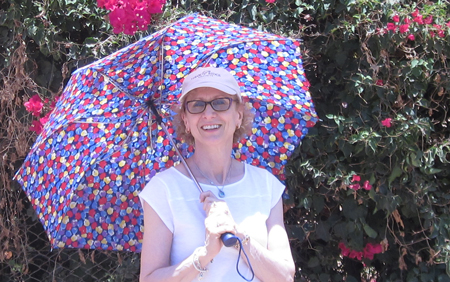 UHN dermatologist, Dr. Cheryl Rosen, following her sun-safety techniques while on vacation.
UHN dermatologist, Dr. Cheryl Rosen, following her sun-safety techniques while on vacation. (Photo: UHN)
Most Canadians would argue that summers are too short. August is already upon us and with so many fun outdoor activities to take part in, like canoeing, swimming and camping, it’s no wonder we wish the season was longer.
“The key is to enjoy your summer,” said Dr. Cheryl Rosen, Dermatologist, UHN. “But protect yourself as best you can while doing so.”
We checked in with Dr. Rosen to learn five tips for protecting yourself against the sun this summer.
Dr. Rosen's tips to stay sun-safe this long weekend.
Plan activities early in the morning or later in the day.
Start your day off with a morning run or tennis match. Prime hours for exposure to skin-damaging ultraviolet (UV) radiation from the sun is generally between 10 am – 2 pm, even on overcast days. If you try to plan activities before or after this timeframe, you have a lower risk of exposure to dangerous UV light.
Wear sunscreen and understand labels.
Apply sunscreen generously and reapply regularly. There are two types of UV light that can harm your skin – UVA and UVB. UVA rays can prematurely age your skin, causing wrinkling and age spots. UVB rays can burn your skin. Sunscreen labelled “broad-spectrum” or “full-spectrum” is designed to protect you from both. SPF stands for sun protection factor, which is a measure of how well the sunscreen deflects UVB rays. Dr. Rosen suggests using an SPF of at least 30.
Wear protective clothing.
Whether you’re taking a dip in the pool, waterskiing at the cottage or visiting the lake for a canoe trip, wear protective gear like a t-shirt over your bathing suit, a wide-brimmed hat or baseball cap, and sunglasses. UV radiation causes cancer and is designated as a Class One carcinogen – the same classification as tobacco products, arsenic and asbestos.
Seek shade when possible.
Protect yourself from UV radiation by using natural shade under a tree, shade structures such as a gazebo or tent, and portable shade under an umbrella.
Don't seek a tan.
“Be happy with the skin colour you were born with,” says Dr. Rosen. The next time you spend hours lying by the pool, remember that tanned skin – even a light tan – is damaged skin. The tan will fade, but the effects of the sun, such as skin cancer risks, do not fade and cannot be reversed. There are also safer ways of getting vitamin D than sun exposure, for example: drinking milk or orange juice and taking Vitamin D supplements.
Related:
5 tips to beat the heat
